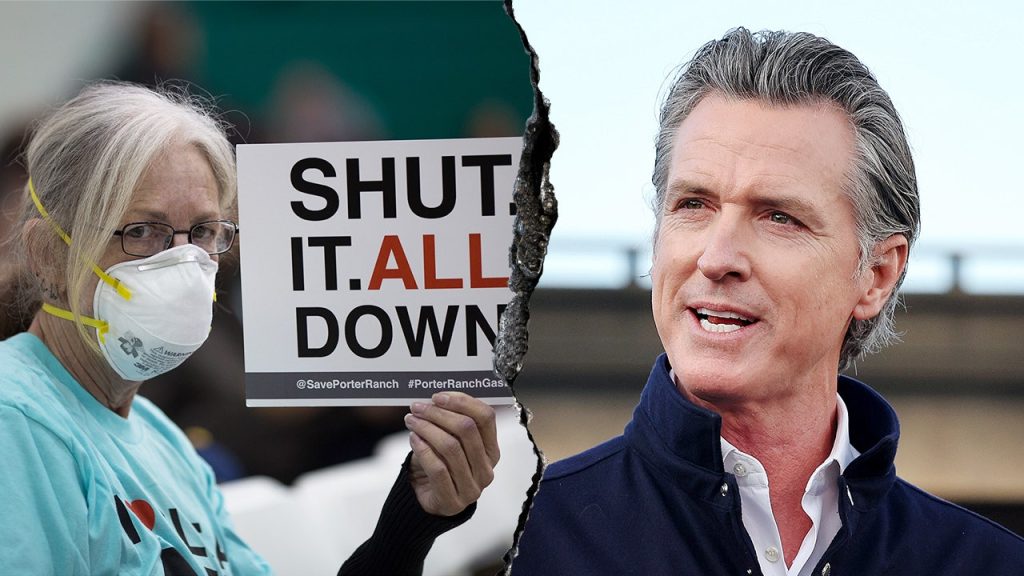In a strategic move targeting Governor Gavin Newsom’s perceived vulnerabilities on climate change, the environmental advocacy group Food & Water Action has launched a six-figure ad campaign across key battleground states. The advertisements criticize Newsom for not fulfilling a 2018 campaign promise to shut down the Aliso Canyon Natural Gas Storage Facility, the site of a major methane leak. This facility, despite Newsom’s earlier pronouncements of an “unequivocal” commitment to its closure, remains operational six years later. Food & Water Action argues that this inaction undermines Newsom’s projected image as a climate leader and casts doubt on his ability to effectively challenge the perceived anti-climate stance of former President Trump. The ad buy, totaling $100,000, specifically targets Nevada, South Carolina, New Hampshire, and Michigan – states known for their political significance in presidential elections. The timing and location of the ads fuel speculation about Newsom’s potential presidential aspirations, as these states often play pivotal roles in primary and general elections.
The central contention of Food & Water Action’s campaign revolves around the discrepancy between Newsom’s rhetoric and action regarding the Aliso Canyon facility. While campaigning for governor, Newsom unequivocally pledged to shut down the facility, citing the massive methane leak and its public health implications. However, the facility continues to operate, leading the environmental group to accuse Newsom of prioritizing the interests of the oil and gas industry over public health and environmental concerns. The ad campaign directly challenges Newsom’s climate leadership credentials, suggesting that his failure to close Aliso Canyon belies his public pronouncements on climate action. This targeted attack aims to expose what Food & Water Action perceives as a gap between Newsom’s image and his actual record on environmental issues, potentially weakening his standing with voters who prioritize climate action.
Responding to the criticism, Newsom’s spokesperson, Daniel Villaseñor, defends the governor’s energy policies, characterizing them as ambitious rather than reckless. Villaseñor argues that the administration is committed to closing Aliso Canyon safely, but not at the expense of causing significant price increases for Californians or jeopardizing the state’s energy supply. The spokesperson highlights Newsom’s efforts in promoting clean and renewable energy, asserting that closing Aliso Canyon prematurely would be irresponsible and could lead to price spikes similar to those experienced in the gasoline market. This defense positions Newsom as a pragmatic leader who balances environmental concerns with the economic realities of energy transition. It implicitly suggests that while the administration acknowledges the need to close Aliso Canyon, the process must be carefully managed to avoid negative consequences for consumers and the state’s energy grid.
The debate over Aliso Canyon underscores the complexities of transitioning to cleaner energy sources while maintaining a reliable and affordable energy supply. The facility, despite its environmental risks, serves as California’s largest underground natural gas storage facility and contributes to stabilizing energy prices, according to the Energy Information Administration. This highlights the tension between the immediate imperative of addressing climate change by phasing out fossil fuels and the practical considerations of ensuring a smooth transition without disrupting energy access or affordability. The California Public Utilities Commission is scheduled to meet in December to discuss the future of the facility, a decision that will likely have significant implications for both California’s energy landscape and Newsom’s political future.
Food & Water Action, however, expands its critique beyond the Aliso Canyon issue, asserting that Newsom’s overall climate record is mixed. The group acknowledges positive steps taken by the governor on oil drilling but criticizes other policies, including those related to rooftop solar, biogas, and carbon capture, as detrimental to climate progress. This broader critique paints a picture of Newsom as a leader who selectively embraces climate-friendly policies while simultaneously supporting initiatives that undermine broader climate goals. By raising these concerns, Food & Water Action seeks to portray Newsom’s environmental stance as inconsistent and opportunistic, thereby challenging his credibility as a national leader on climate change.
The strategic placement of the ads in battleground states, coupled with the timing coinciding with speculation about Newsom’s potential 2028 presidential bid, adds another layer of political intrigue to this environmental debate. Newsom’s prominent role as a surrogate for President Biden’s re-election campaign and his previous consideration as a potential presidential candidate have positioned him as a rising star within the Democratic Party. The ad campaign by Food & Water Action, therefore, can be interpreted as a preemptive strike aimed at exposing Newsom’s perceived weaknesses on climate change before he potentially launches a presidential campaign. By highlighting these vulnerabilities early on, the group hopes to influence public perception of Newsom’s leadership and potentially impact his political trajectory.

